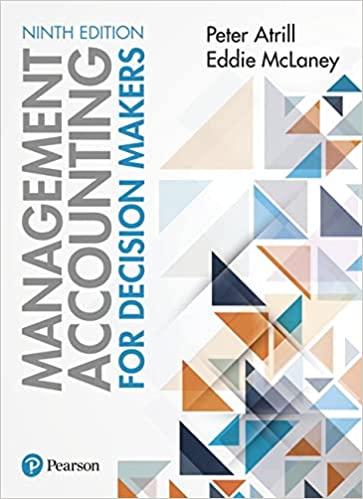Question
[The following information applies to the questions displayed below.] In each of the cases below, assume that Division X has a product that can be
[The following information applies to the questions displayed below.]
| In each of the cases below, assume that Division X has a product that can be sold either to outside customers or to Division Y of the same company for use in its production process. The managers of the divisions are evaluated based on their divisional profits. |
| Case | ||
| A | B | |
| Division X: | ||
| Capacity in units | 100,000 | 100,000 |
| Number of units being sold to outside customers | 100,000 | 80,000 |
| Selling price per unit to outside customers | $50 | $35 |
| Variable costs per unit | $30 | $20 |
| Fixed costs per unit (based on capacity) | $8 | $6 |
| Division Y: | ||
| Number of units needed for production | 20,000 | 20,000 |
| Purchase price per unit now being paid to an outside supplier | $47 | $34 |
References
Section BreakExercise 12A-1 Transfer Pricing Situations [LO12-5]
1.
value: 0.75 points
Required information
Exercise 12A-1 Part 1
| Required: |
| 1a. | Refer to the data in case A above. Assume that $2 per unit in variable selling costs can be avoided on intracompany sales. 1b. If the managers are free to negotiate and make decisions on their own, will a transfer take place? 2a. Refer to the data in case B above. In this case, there will be no savings in variable selling costs on intracompany sales. Determine the transfer price of the selling division. 2b. If the managers are free to negotiate and make decisions on their own, will a transfer take place? 2c. What is the range of transfer price the managers of both divisions should agree?
|
Step by Step Solution
There are 3 Steps involved in it
Step: 1

Get Instant Access to Expert-Tailored Solutions
See step-by-step solutions with expert insights and AI powered tools for academic success
Step: 2

Step: 3

Ace Your Homework with AI
Get the answers you need in no time with our AI-driven, step-by-step assistance
Get Started


